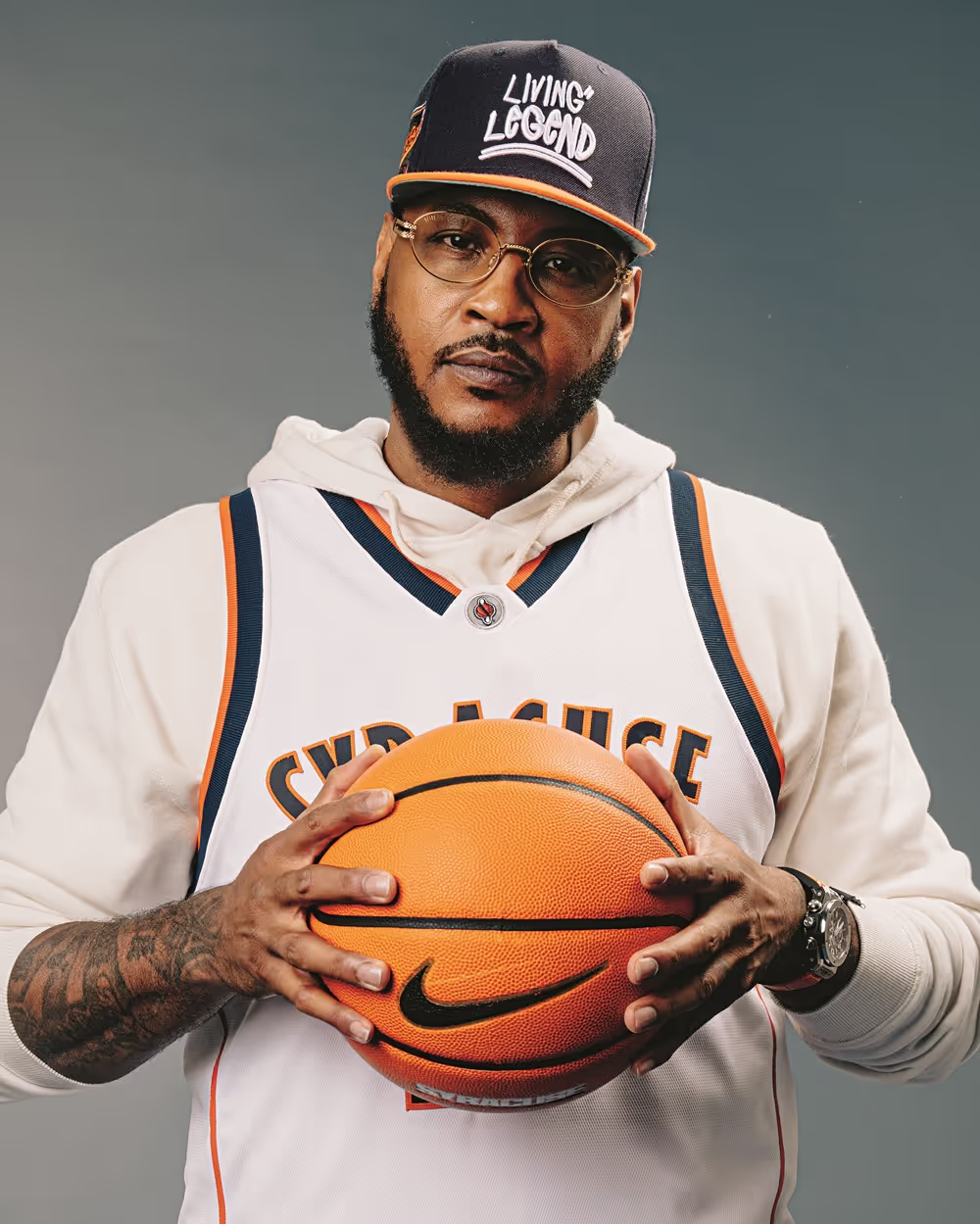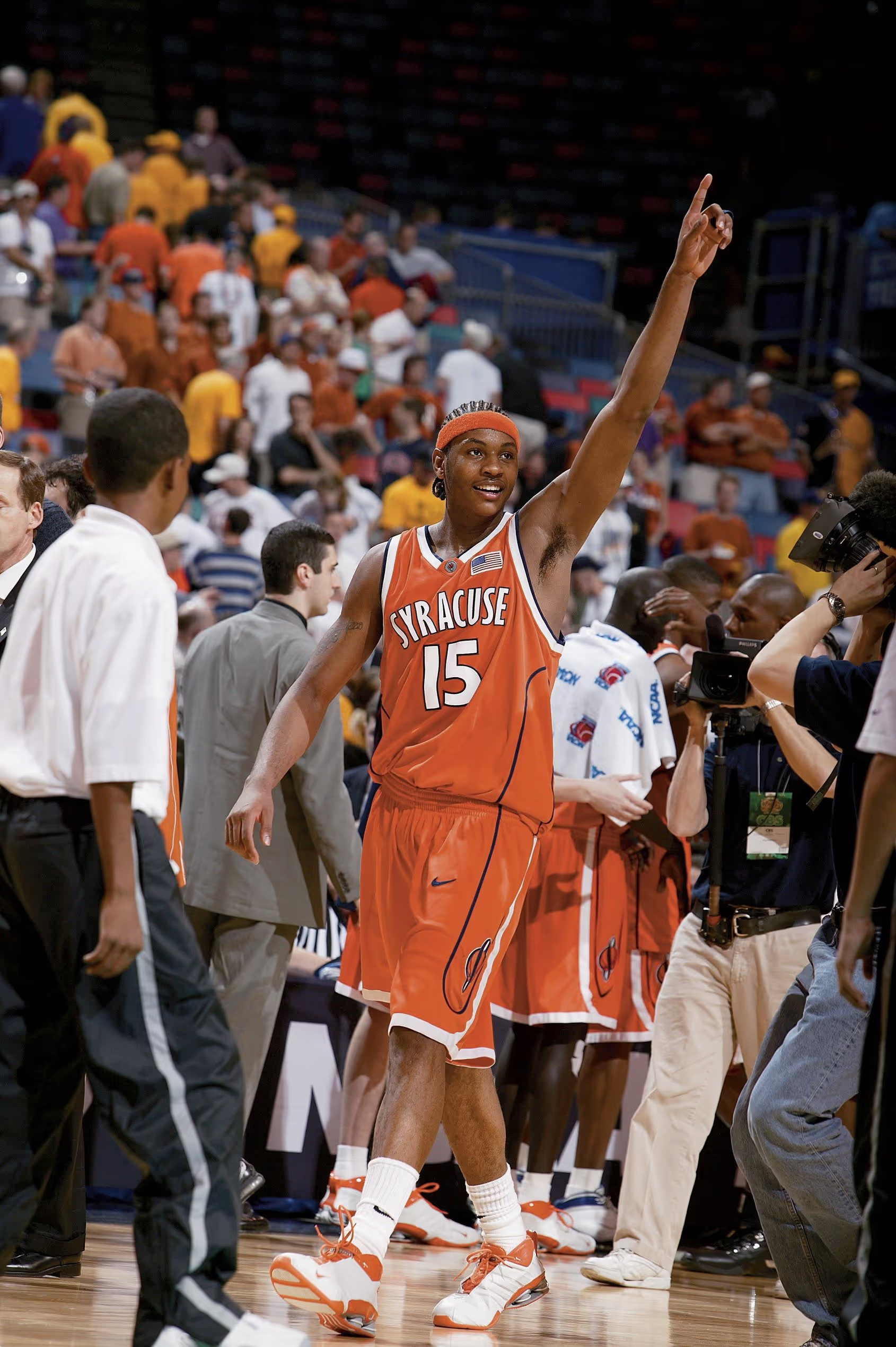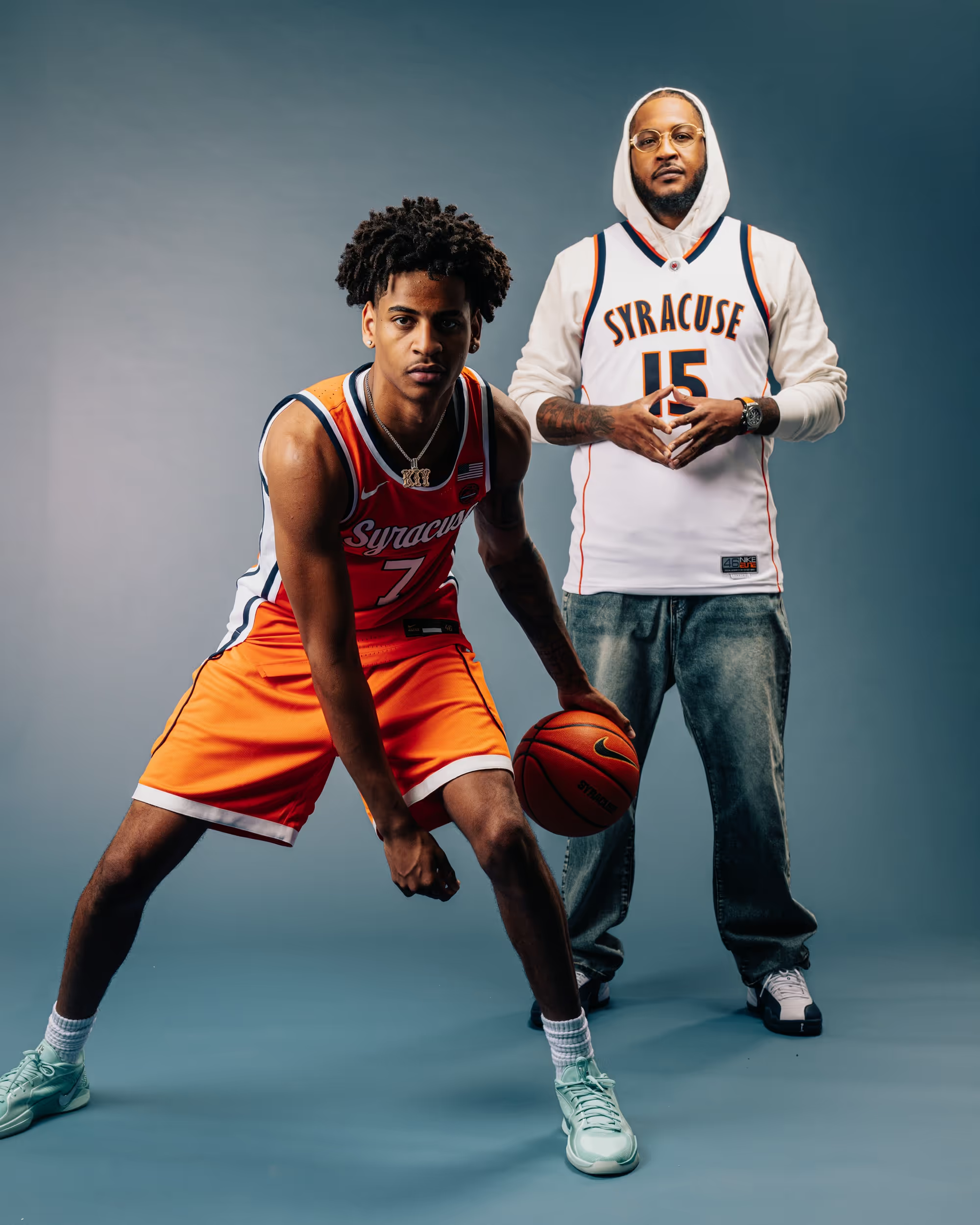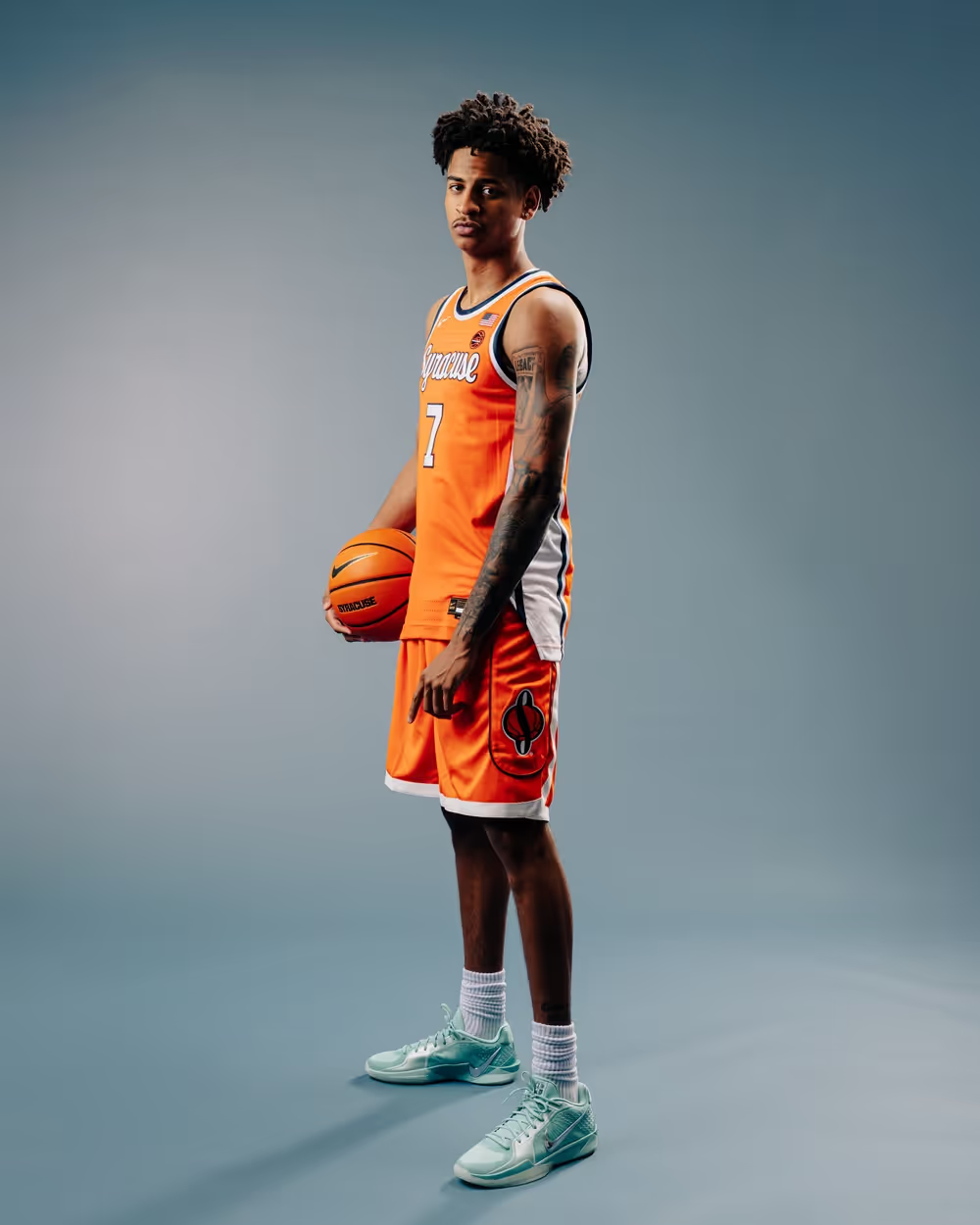.avif)
Syracuse wasn’t expected to win it all that year. But Melo played with the calm of someone who’d already read the last page. Midrange fadeaways, smooth like butter. Big shot after big shot. Bucket after bucket. When the confetti fell in New Orleans, the Carrier Dome back in upstate New York would never be the same. Syracuse, a program that had long flirted with greatness but never sealed the deal, had its first-ever national championship. And it had its forever king.
The image of Melo cutting down the net is tattooed on college basketball history. He raised it high like a crown, grinning with a perfect blend of relief that the season-long mission was finally complete, and inevitability, like this destiny had been waiting for him all along.
Fast-forward two decades, and the echoes of that night still ring loud. But now, the soundtrack has changed. Carmelo’s name is etched in Olympic record books, he’s a 10-time NBA All-Star, and now, in the Naismith Memorial Basketball Hall of Fame. And in the very same breath, his son, Kiyan, is walking onto Syracuse’s campus, wearing the same orange jersey his dad used to, ready to write his own script.
For Kiyan, life in basketball has never been quiet. Growing up as Melo’s son meant you were referred to as “Melo’s son” until you carved a name out for yourself. The cameras were always waiting, even when the jump shot wasn’t falling. When Kiyan’s game was still raw, when the rankings and offers weren’t flooding in like they were for many of his peers, whispers of doubt followed him. But instead of shrinking or running away from it, Kiyan says that he only poured himself deeper into the work.


“The pursuit is definitely about consistency,” he says. “Just staying in the gym and being consistent with everything you do. And not letting the outside noise get to you. I feel like that’s a big part when it comes to getting better and being able to step up to the plate. I just kept my head down so I could be ready when the time comes.”
And right by his side the whole way stood his father, seeing the star in Kiyan before Kiyan could see it for himself. “From where I sit at, I look at certain aspects of the game, probably totally different than the average person would look at it,” Carmelo says. “For me, it was just all about confidence with him and him getting the confidence in himself that he can go out there and [he] is just as good as everybody else. I wouldn’t say he was a late-bloomer. I think his development all came together at the right time.”
Sure, being the son of an NBA Hall of Famer opens doors most kids will never see. But Kiyan still had to live up to expectations and deal with immeasurable pressure that the average high schooler couldn’t even fathom. Nothing was handed to him. Case in point: he was snubbed from the McDonald’s All American Game, in New York at that, so how did Kiyan respond? Only by winning MVP honors at the Jordan Brand Classic, putting up 26 points and 5 rebounds in just 20 minutes. And just for good measure, he added 25 points in 21 minutes to take home the People’s Choice Award at the Allen Iverson Classic Game.
Nevertheless, Kiyan wrapped his grassroots career as the consensus top player in New York and now steps into Syracuse as one of the city’s most hyped recruits in recent memory.
“I’m excited to play on a bigger stage, in front of more fans, in front of more people, higher expectations, higher every-thing, just taking a step into that next level,” he says. “I feel like all the work that we’ve been putting in is definitely going to show on that level. And I’m definitely looking forward to going into the Dome and going into away games, being ready to compete and being able to win.”
For Melo, this is uncharted territory. He knows the arena, the crowd, the stakes—but now he’ll be watching from the sidelines. “I know what it’s like to get ready for a Georgetown game, or get ready for a Villanova game, or Pittsburgh, or St. John’s,” he says. “I know what the Dome feels like with 35,000 people in there. He hasn’t experienced that yet. I’m excited for the unknown of how he’s going to react to it. He’s gotta get prepared for that. The game is the game—but it’s also a lot that comes with the game.”
Kiyan shares that sentiment, laying out his own mindset: “On the court, I want to be remembered in college as somebody who’s winning. I don’t want to go to college and be [on] a losing team and have to worry about people transferring and stuff like that,” he says. “I just want to build a good brotherhood with my teammates and coaches and be able to go out there and win. I feel like when you go out there and win as a team, all of the individual success comes after that.”


While Kiyan is forging his own legacy, he doesn’t shy away from the weight his name carries. In fact, he leans into it. That’s part of why he chose Syracuse—when nearly every school in the country would have welcomed him. This wasn’t pressure or expectation; it was his choice, fully aware of everything that comes with it. It says a lot about the type of kid he is, and why he is who he is.
“I think he understood the assignment,” says Melo. “I think he gave himself time to think and go visit and see what else was actually out there. I think him understanding the connectivity and the safe space that we’ve created up there, he wanted to be a part of that. But he also wanted to be a part of the turnaround.”
Through it all, Melo recognizes the symmetry between their journeys. Kiyan’s path mirrors the lessons Melo learned in his own rise, from perseverance to patience, from humility to confidence.
“There are similarities between our paths to Syracuse,” Melo says. “For one, [we were both] overlooked, always feeling like you have to work two times, three times, four times as hard as the next person. He understands that he controls what happens, and I understood that I controlled what was going to happen. Just that mindset of trying to get to the same spot, the same place, accomplish the same thing—just with two different routes to get there. There’s nothing wrong with that.”
And yet, there’s something profoundly new about this chapter. Melo can no longer control the outcomes, the games or the decisions; he can only witness, support and savor. The torch has been passed, and in watching his son step into the limelight, Melo is already learning how to live alongside it.
After decades under the brightest lights, Melo himself is stepping into a new phase of life. One where the game still matters, but the spotlight shifts. Now, the focus is all about life beyond the court and watching his son take the stage. He’s had a front row seat to Kiyan’s journey, and through it, Melo’s love for the game hasn’t changed. But it has evolved.
“The NBA book for me as a player will be shut as of September 6 [Melo’s Hall of Fame induction—Ed.], and after that it’s everything else. I get to focus on other businesses. I get to focus on building, scaling and being creative,” he says. He’s already built a media empire with his excellent podcast “7PM in Brooklyn,” and starting this upcoming season, he’ll be joining NBC as an analyst. “But also, running behind Kiyan and supporting him. This is the moment where I really want to just enjoy going to the games. I’ve never been to Cameron Indoor Stadium. As a fan and as a father, now I get a chance to have these experiences going to the Dean Smith Center and Cameron Indoor, and as a supporter of college basketball, and understanding what this is about. And so I get a chance to live through Kiyan.”
Melo recalls the honest conversations with his son when he was still figuring out exactly what he wanted to do. The conversations encouraging Kiyan to be patient. He stayed in his ear. Your time is gonna come. You’re not the same as everybody else, and they’re not the same as you. Some people might be better than you right now, but when everything starts to click, you’re gonna look back and be like…damn.

“My dad is the biggest. He influenced everybody,” Kiyan says. “And then on the court, he’s always there courtside, telling me what I need to do. I wouldn’t be here now if he wasn’t doing that. I wouldn’t have a sense of direction.
“This is the calm before the storm,” Kiyan continues. “This is the last moment before everything gets poppin’. The last moment before the Hall of Fame, the last moment before my season starts. The last time it’s going to be something like this.”
There’s a poignancy to the moment. Moments like this remind you: basketball may be the platform, but it’s not the foundation. This is a father and son coexisting with the same last name, the same expectations, the same weight of legacy.
A championship in 2003 that rewrote Syracuse basketball history. A Hall of Fame induction in 2025 that cements an iconic career. And in between, the torch being passed from father to son, from Melo to Kiyan, from the established legend to a legacy in the making.
As the book closes on one career, another begins. And the name Anthony stays written in orange.

 SHOP COLLECTION
SHOP COLLECTION

